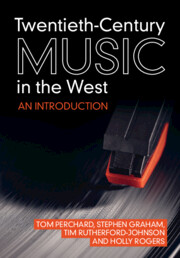Book contents
- Twentieth-Century Music in the West
- Twentieth-Century Music in the West
- Copyright page
- Contents
- Figures
- Tables
- Acknowledgements
- Introduction
- Part I Histories
- Part II Techniques and Technologies
- 5 Work and Notation
- 6 Rhythm and Time
- 7 Harmony
- 8 Instruments
- Part III Mediation
- Part IV Identities
- Bibliography
- Index
7 - Harmony
from Part II - Techniques and Technologies
Published online by Cambridge University Press: 15 September 2022
- Twentieth-Century Music in the West
- Twentieth-Century Music in the West
- Copyright page
- Contents
- Figures
- Tables
- Acknowledgements
- Introduction
- Part I Histories
- Part II Techniques and Technologies
- 5 Work and Notation
- 6 Rhythm and Time
- 7 Harmony
- 8 Instruments
- Part III Mediation
- Part IV Identities
- Bibliography
- Index
Summary
Harmony is a very large area of musical debate and practice. As with our previous chapter on ‘Rhythm and Time’ (➔Chapter 6), we must begin with a brief definition. In popular usage, the word ‘harmony’ often refers to something pleasurable, calming and consonant: think of ‘sweet harmony’ or ‘peace and harmony’; things are also good when they are ‘harmonious’. In this chapter, however, ‘harmony’ will be used in a more pragmatic way to refer to the sound of two or more pitches sounding together to create intervals and chords, and the various practices developed by musicians to organise those chords, not only in isolation from one another but also in larger networks to create harmonic languages and musical structures. Nevertheless, those popular idioms reveal something of harmony’s potential to invoke ideological, social and even political systems of value, and it is these that will be the subject of this chapter.
- Type
- Chapter
- Information
- Twentieth-Century Music in the WestAn Introduction, pp. 179 - 201Publisher: Cambridge University PressPrint publication year: 2022

